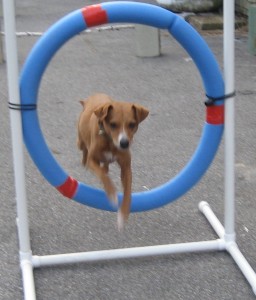When Grace and I entered our agility class last week, it immediately hit me that learning takes time, repetition, and patience. I was walking around the agility room in familiar territory, feeling good about that. Yet I was simultaneously starting to worry if Grace and I would do well – or would we falter? Would we remember what we had learned from last year? Did I know when to do the front cross instead of the back cross? All sorts of questions started running through my head. I was feeling the pressure.
It was a bit scary. And all this for a fun agility course! In some ways, coming back was even more intimidating to me than when we went to our first lesson last year. At that point, expectations were low. Grace and I had no idea what to do and we relied on Rachel to instruct our every move. We were given lots of time to learn and pace our progress, without a specific deadline for mastering a particular skill.
But this time, I could feel an artificial expectation I had placed on us. It was clear that Grace wasn’t bothered by any lofty goal-setting. She wore a big smile and easily made her way around the equipment, prancing over the A-frame and skipping over the hurdles, whether she was supposed to or not! She was having fun and it helped me to remember not to put pressure on the situation.

When we train others in the workplace – in fact when we are being trained – do we put unnecessary expectations on where we should be? I do believe we need goals, which are critically important to know where we are going and to stretch us past our comfort zone. But I also see, far too often, situations in the workplace where a manager has an unrealistic expectation for what a person should be accomplishing when they are learning a new behavior or skill. It takes time, repetition, and patience. (Oh, I already said that. But I think it bears repeating.)
Often, our training efforts get off to a great start because there is a strong focus and commitment to the effort, and we start to get lulled into complacency, believing the person being trained is all set. However as reinforcement and encouragement begin to wane, results suffer. Lucky for me and Grace, Rachel continued to provide that much-needed support. Having that guidance calmed my nerves and settled me back into having fun, which gave me the environment where I could learn openly, without being afraid of making a mistake. It is a big help to think of that now when I see someone moving through a new phase of their learning. In what ways can you encourage yourself, and others, to learn new behaviors?


